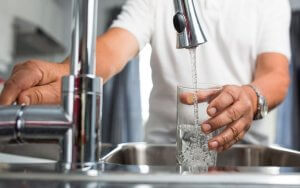Tap Water: Pros and Cons

Tap water can be as natural as bottled water, because in most cities tap water is of excellent quality. This is thanks to local authorities and the frequent, strict and careful monitoring that they perform.
Tap water benefits
Sometimes, tap water can have better sanitary control than bottled water. Studies have proved that plastic containers are made of polycarbonate and PVC, both of which contain Bisphenol A (BPA). This synthetic compound can be released into the contents of the bottle.
Moreover, when we burn bottles made from this compound, it releases dioxin and furans (which are both toxic and carcinogenic substances) into the atmosphere.
Tap water is generally distributed through pipes, without requiring energy to bottle, package and transport it. Also, the processing of tap water doesn’t generate unnecessary plastic waste or harmful residues.
Storage and distribution conditions, such as high temperatures, don’t affect tap water. It doesn’t have an expiration date either.

Tap water is also cheaper than bottled water. Some studies say that it might be up to 250 times cheaper! This is why consuming it could be beneficial for people and the environment.
Many studies prove that producing two pints of bottled water from a recognized brand, can generate up to 600 times more carbon dioxide, than producing two pints of tap water.
To make one pint of bottled water, you’d need six pints of tap water, in addition to the energy required to produce and transport it. Recycling is also important, because if you just throw away the bottle without recycling it, environmental consequences are horrendous.
Consequences of using plastic bottles
Most of the time, plastic bottles and containers end up in rivers and seas, forming islands of plastic residues. These residues ultimately end up in your body, this is due to plastic particles contaminating food products.
Usually, the containers we use are single-use bottles or packages. If we don’t find a solution, our own waste will generate consequences that are even worse. In Spain alone, 3.5 million out of 5 million water bottles, end up in dumpsters, burned or littering the environment.
The bottled water industry makes us believe that bottled water is superior to tap water, but that’s just a social myth that comes from marketing and publicity.
Tap water cons
The substances that tap water contains
Substances like chlorine or chloramine have always been used as disinfectants, which is why they can get into our faucets. Chlorine is a very harmful chemical for our health. According to the Council on Environmental Quality of the United States, people who drink chlorinated water have a 93 percent higher chance of getting cancer.
Chlorine can also bond with other substances and form trihalomethanes: chlorine derivatives that allow the formation of free radicals in your body which cause serious cell damage.
On the other hand, chloramine is related to respiratory, skin, digestive, kidney and blood problems.

These are some disadvantages of drinking tap water; but you can avoid them by using a good faucet water filter. This way, you can avoid bottled water too.
Other substances that tap water contains:
- Heavy metals: aluminum, lead, arsenic and chromium.
- Fluoride: it’s not only unnecessary to prevent dental cavities, but it’s also very damaging to your health.
- Pesticides and herbicides: the overuse of these substances doesn’t just affect our food. They also affect our drinking water, when they become absorbed by the rain, snow and irrigation systems.
- Medication traces: our medicines end up in the rivers and reservoirs that supply water to our homes. They’re resistant to the processes in water treatment plants and end up in the tap water that we drink.
- Radioactive isotopes: they can come from natural radioactivity, nuclear power plants, nuclear accidents or accidental spills in rivers. The consequences are still unpredictable.
- Volatile organic compounds.
Tap water can be as natural as bottled water, because in most cities tap water is of excellent quality. This is thanks to local authorities and the frequent, strict and careful monitoring that they perform.
Tap water benefits
Sometimes, tap water can have better sanitary control than bottled water. Studies have proved that plastic containers are made of polycarbonate and PVC, both of which contain Bisphenol A (BPA). This synthetic compound can be released into the contents of the bottle.
Moreover, when we burn bottles made from this compound, it releases dioxin and furans (which are both toxic and carcinogenic substances) into the atmosphere.
Tap water is generally distributed through pipes, without requiring energy to bottle, package and transport it. Also, the processing of tap water doesn’t generate unnecessary plastic waste or harmful residues.
Storage and distribution conditions, such as high temperatures, don’t affect tap water. It doesn’t have an expiration date either.

Tap water is also cheaper than bottled water. Some studies say that it might be up to 250 times cheaper! This is why consuming it could be beneficial for people and the environment.
Many studies prove that producing two pints of bottled water from a recognized brand, can generate up to 600 times more carbon dioxide, than producing two pints of tap water.
To make one pint of bottled water, you’d need six pints of tap water, in addition to the energy required to produce and transport it. Recycling is also important, because if you just throw away the bottle without recycling it, environmental consequences are horrendous.
Consequences of using plastic bottles
Most of the time, plastic bottles and containers end up in rivers and seas, forming islands of plastic residues. These residues ultimately end up in your body, this is due to plastic particles contaminating food products.
Usually, the containers we use are single-use bottles or packages. If we don’t find a solution, our own waste will generate consequences that are even worse. In Spain alone, 3.5 million out of 5 million water bottles, end up in dumpsters, burned or littering the environment.
The bottled water industry makes us believe that bottled water is superior to tap water, but that’s just a social myth that comes from marketing and publicity.
Tap water cons
The substances that tap water contains
Substances like chlorine or chloramine have always been used as disinfectants, which is why they can get into our faucets. Chlorine is a very harmful chemical for our health. According to the Council on Environmental Quality of the United States, people who drink chlorinated water have a 93 percent higher chance of getting cancer.
Chlorine can also bond with other substances and form trihalomethanes: chlorine derivatives that allow the formation of free radicals in your body which cause serious cell damage.
On the other hand, chloramine is related to respiratory, skin, digestive, kidney and blood problems.

These are some disadvantages of drinking tap water; but you can avoid them by using a good faucet water filter. This way, you can avoid bottled water too.
Other substances that tap water contains:
- Heavy metals: aluminum, lead, arsenic and chromium.
- Fluoride: it’s not only unnecessary to prevent dental cavities, but it’s also very damaging to your health.
- Pesticides and herbicides: the overuse of these substances doesn’t just affect our food. They also affect our drinking water, when they become absorbed by the rain, snow and irrigation systems.
- Medication traces: our medicines end up in the rivers and reservoirs that supply water to our homes. They’re resistant to the processes in water treatment plants and end up in the tap water that we drink.
- Radioactive isotopes: they can come from natural radioactivity, nuclear power plants, nuclear accidents or accidental spills in rivers. The consequences are still unpredictable.
- Volatile organic compounds.
This text is provided for informational purposes only and does not replace consultation with a professional. If in doubt, consult your specialist.








